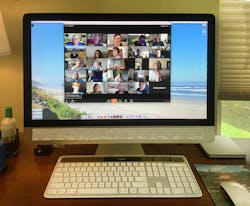So how many Zoom meetings have you been in this week?
For myself, it’s only been one, and that particular meeting wasn’t even work-related, but to catch up with friends. I’m still doing mainly voice-conferencing for work (usually via Microsoft Teams) and I’m very glad I don’t have to show my face—I haven’t had a haircut since February!
On the other hand, my wife (who, as I write this, is working just across the dining room table from me) seems sometimes to be in a single, never-ending Zoom meeting, and I guess a lot of the country is in a similar situation.
Two months ago I had never heard of Zoom and now it seems to have become the standard application for remote meetings. Of course people are still using Google Hangouts, Facetime and any number of other applications to stay connected, not just with co-workers, clients and customers, but friends and family as well.
It’s gotten to the point where some people, just for the sake of variety, have begun having business meetings on multi-player gaming platforms such as Minecraft or even Red Dead Redemption. (Imagine virtual cowboys sitting around a virtual campfire discussing the latest revenue numbers or whatever; and when the meeting ends they all get on their virtual horses and ride off into the night.)
Along with the video conferencing, Webinars have been having a banner year. It seems there’s not a major manufacturer or industry association these days that isn’t promoting one Webinar or another. Naturally, most these days are about either dealing with the pandemic or preparing for America’s return to work, but there are still plenty that cover such topics as technical training, marketing advice or business development tips (and honestly, they’re not a bad way to make use of the downtime).
The thing about the plumbing and heating industry, though, is that the work is hands-on. For all the scheduling, planning, ordering, invoicing and the thousand-and-one other thing things that can be done remotely, at the end of the day someone has actually got to get in there and braze that pipe, snake that drain, replace that valve, and until the day comes when someone invents a plumbing robot it looks like someone always will.
Which is one of the great things about the industry, really. It’s never going to be outsourced to India or China. It will never be automated by some Artificial Intelligence algorithm. But for right now we’re stuck in the middle of a pandemic, and—essential service or not—people are scared.
So even the plumbing and heating industry is finding ways to work remotely. IAPMO is now performing inspections by having a worker walk the site with a phone taking live video and listening to live instruction. Is it as good as having a certified inspector walk the site? No, but it’s good enough, given the circumstances.
For several years, our columnist Matt Michel has talked about “thought-leadership” marketing, where you promote your expertise by sharing that expertise, for example through short, how-to videos: how to fix a leaky faucet, how change a shut-off valve, how to unclog a toilet. The argument against is that it appeals to the DIY crowd and means less work.
The argument for is that if they’re looking at how-to videos anyway, they may as well be looking at yours, seeing a technician in your company uniform, on your company YouTube channel (alongside testimonials from your satisfied customers and happy, well-groomed employees)—that the money you lose on clogged toilets you make up on water heater installations and other types of work that no DIY-er in their right mind would ever tackle.
So, no, plumbing can never be 100% remote. But there are still ways to stay in touch during this “touchless” time, and those efforts can really pay off for your business.
About the Author
Steve Spaulding
Editor-in-Chief - CONTRACTOR
Steve Spaulding is Editor-in-Chief for CONTRACTOR Magazine. He has been with the magazine since 1996, and has contributed to Radiant Living, NATE Magazine, and other Endeavor Media properties.
